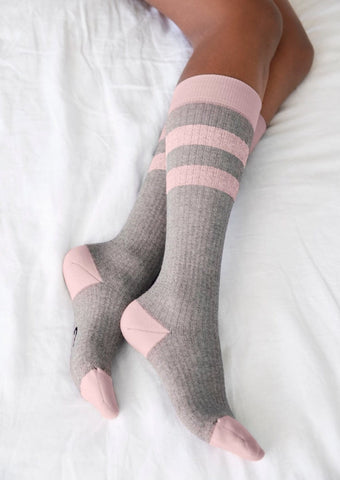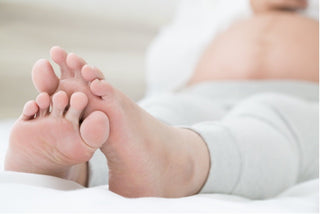3 min read
BY LAUREN BRENTON | Clinical Midwifery Specialist | Childbirth Educator | Mama of 4
Pregnancy is one of the largest contributing factors to women developing varicose veins which can then lead to venous insufficiency and leg edema (swelling).
Approximately 40% of pregnant women develop varicose veins and women who have been pregnant before are at an increased risk of developing them. Varicose veins and swelling of the legs not only inhibit a woman’s self-confidence but also causes pain, night cramps, numbness, tingling, heaviness and aching legs.
1. What causes varicose veins?
The body's veins are responsible for ensuring blood flows back to the heart. To assist this process veins are designed with a series of valves, which close between heartbeats to prevent the blood flowing backwards.

Varicose veins occur when a valve in the blood vessel walls weakens, and the blood doesn’t move through properly. The vein then becomes stretched and saggy causing the vein to become a tiny balloon near the surface of the skin.
It is most commonly the veins in the legs that are affected as gravity comes into play however, the vulva (vaginal opening) and rectum can be affected as well.
2. Why does pregnancy increase your risk of developing varicose veins?
With pregnancy increases risk for a number of reasons:
- Increase in blood volume - during pregnancy the body produce up to 50% more blood and the heart is working harder to pump the blood around the body and to the baby, which puts increased pressure on the veins.
- Hormone changes - during pregnancy, the hormone progesterone increases, and this relaxes the muscular walls of the blood vessels, making it more difficult for the blood to move from the lower body back to the heart.
- Pregnancy weight gain - the increasing weight of your growing baby puts pressure on pelvic veins and the inferior vena cava, thus increasing blood pressure in the leg veins. As the uterus grows bigger these veins will become more prominent.
The slowing down of the movement of the blood causes blood to pool in the legs, forcing fluid into the tissues of the feet and ankles and therefore causing swelling of the legs, ankles and feet.
3. What can be done to prevent and treat varicose veins and leg oedema (swelling)?
Options for treatment of varicose veins include surgery, pharmacological and non-pharmacological treatments. Non-pharmacological treatments are usually the first line of treatment and include:

- Graduated compression socks or leggings - compression socks or leggings have been shown to relieve the swelling and aching of the legs as well as preventing more varicose veins developing. Graduated compression socks, like TheRY Compression Socks are tightest at the ankle and gradually get looser further up the leg. This is to help encourage the blood flow back to the heart from the legs. Additionally, wearing compression socks within 2-3 weeks of finding out you are pregnant can help to prevent or reduce the severity of varicose veins and leg swelling.
-
Rest - It is important to not stand for long periods of time and to take regular breaks from standing. When women are resting it is recommended to lie on your left side with legs elevated.

-
Foot massage & reflexology - This has the potential to reduce symptoms and pain from varicose veins by attempting to move the fluid. Massage helps to reduce leg swelling and move the fluid from the legs.

- Water immersion - Water immersion can help the blood move upward through the venous and lymphatic systems therefore reducing leg swelling and varicose veins.

4. Will it go back to normal after birth?
Varicose veins usually improve around four months after birth and the swelling decreases over the first 6 weeks after birth. Wearing your maternity compression socks or compression leggings and resting with your legs elevated can help reduce swelling and pain in the first few months after birth. Once you get varicose veins they are more likely to reoccur in the future due to already weakened vessel walls.
So, get yourself some TheRY graduated compression socks or leggings to prevent or relieve pain from varicose veins and leg swelling throughout pregnancy and the postpartum period - with the bonus of looking super cute!!
______________________________________________________________
One Mama Midwife - Lauren Brenton
Clinical Midwifery Specialist | Childbirth Educator | Mama of 4

